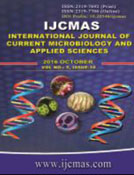


 National Academy of Agricultural Sciences (NAAS)
National Academy of Agricultural Sciences (NAAS)

|
PRINT ISSN : 2319-7692
Online ISSN : 2319-7706 Issues : 12 per year Publisher : Excellent Publishers Email : editorijcmas@gmail.com / submit@ijcmas.com Editor-in-chief: Dr.M.Prakash Index Copernicus ICV 2018: 95.39 NAAS RATING 2020: 5.38 |
The antimicrobial effect of essential oils from oregano (Origanum compactum L.) and thyme (Thymus vulgaris L.) was investigated using the classical agar-gel diffusion method. Pure cultures of 20 pathogenic strains were tested (by 4 strains of Pseudomonas aeruginosa, Klebsiella pneumoniae, Pasteurella multocida, Enterococcus faecalis and Candida albicans). Both oils exhibited significant in vitro inhibitory activity against the tested bacterial and fungal strains. Thyme essential oil showed a slightly higher antimicrobial activity as compared to that of oregano when was applied in high final concentrations of 1 - 4%. The oregano oil, however, showed higher inhibitory effect compared to that of thyme when was administered at low concentrations between 0,032% and 0,5%.The antimicrobial action of both oils was best expressed when were administered in a final concentrations not lower than 1%, while concentrations below 0,5% were not sufficient for expression of an effective action to most strains. Most pronounced was the inhibitory effect of the essential oils from oregano and thyme against the Gram-positive microorganisms tested - E. faecalis and C. albicans. From the tested Gram-negative bacteria, the highest sensitivity to the oils showed the P. aeruginosa strains. These results are very promising from a practical standpoint, since enterococci, and P. aeruginosa distinguish with high resistance to antimicrobials and rapid development of resistance to the antibiotics applied in infections with their participation. High value in this aspect have and the results received for C. albicans, as antifungals are too few and the treatment of mycosis is difficult and prolonged.
 |
 |
 |
 |
 |